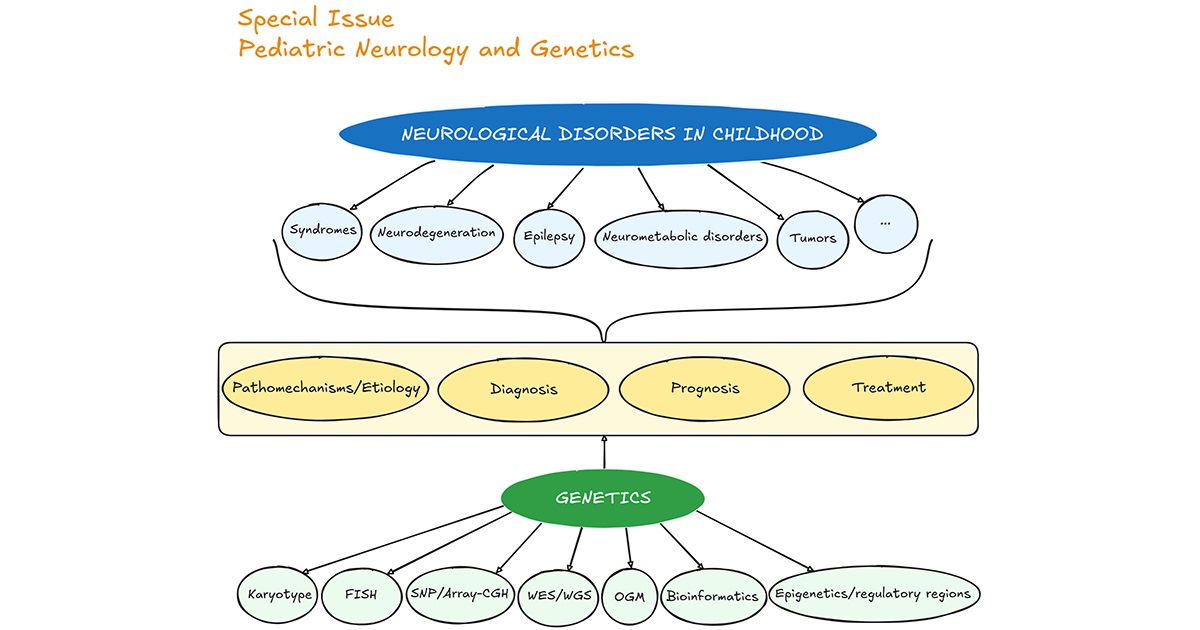Pediatric Neurology and Genetics
A special issue of Genes (ISSN 2073-4425). This special issue belongs to the section "Neurogenomics".
Deadline for manuscript submissions: 25 May 2026 | Viewed by 842

Special Issue Editors
Interests: neurodevelopmental disorders; dysmorphology; genetics; genotype–phenotype correlations
Interests: human genetics; neurogenetics; medical genetics; autism spectrum disorders; neurology; neuroscience; ADHD
Special Issue Information
Dear Colleagues,
The burden of rare diseases largely falls on children, impacting healthcare services and shaping their developmental trajectories. In children, neurological disorders comprise a substantial share of such diseases.
Both congenital and progressive or acquired neurological conditions (e.g., syndromic conditions, neurodegeneration, epilepsy, tumors) may have a genetic origin. Although diagnosis is often challenging, recent advances in genetic diagnostic techniques have significantly lowered the diagnostic threshold, facilitating better prediction of prognosis and treatment management. Furthermore, identifying a genetic etiology contributes to an expanded understanding of the biological pathomechanisms of diseases and facilitates the targeting of precise therapeutic strategies.
Integrating cytogenetic and sequencing techniques (e.g., standard karyotype, FISH, SNP/array-CGH, optical genome mapping, whole-exome sequencing, whole-genome sequencing) reveals structural, numerical, and genomic mutations, enabling a comprehensive genomic analysis. Regulatory elements also warrant attention, as they influence gene expression and modulation. Bioinformatic analysis can assist with the interpretation of the extensive data generated via the genetic analysis and predicting the ways in which genomic imbalances and mutations will affect the phenotype.
We are seeking submissions of original research or review articles related to "Pediatric Neurology and Genetics". All types of research related to the genetic landscape of neurological diseases in children will be considered. We look forward to receiving your contributions.
Dr. Roberta Milone
Dr. Agatino Battaglia
Dr. Alberto Danieli
Guest Editors
Manuscript Submission Information
Manuscripts should be submitted online at www.mdpi.com by registering and logging in to this website. Once you are registered, click here to go to the submission form. Manuscripts can be submitted until the deadline. All submissions that pass pre-check are peer-reviewed. Accepted papers will be published continuously in the journal (as soon as accepted) and will be listed together on the special issue website. Research articles, review articles as well as short communications are invited. For planned papers, a title and short abstract (about 250 words) can be sent to the Editorial Office for assessment.
Submitted manuscripts should not have been published previously, nor be under consideration for publication elsewhere (except conference proceedings papers). All manuscripts are thoroughly refereed through a single-blind peer-review process. A guide for authors and other relevant information for submission of manuscripts is available on the Instructions for Authors page. Genes is an international peer-reviewed open access monthly journal published by MDPI.
Please visit the Instructions for Authors page before submitting a manuscript. The Article Processing Charge (APC) for publication in this open access journal is 2600 CHF (Swiss Francs). Submitted papers should be well formatted and use good English. Authors may use MDPI's English editing service prior to publication or during author revisions.
Keywords
- rare neurological diseases
- genomics
- next-generation sequencing
- cytogenetics
- child neurology
Benefits of Publishing in a Special Issue
- Ease of navigation: Grouping papers by topic helps scholars navigate broad scope journals more efficiently.
- Greater discoverability: Special Issues support the reach and impact of scientific research. Articles in Special Issues are more discoverable and cited more frequently.
- Expansion of research network: Special Issues facilitate connections among authors, fostering scientific collaborations.
- External promotion: Articles in Special Issues are often promoted through the journal's social media, increasing their visibility.
- Reprint: MDPI Books provides the opportunity to republish successful Special Issues in book format, both online and in print.
Further information on MDPI's Special Issue policies can be found here.







